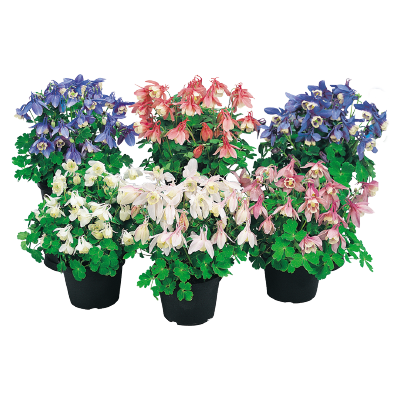

Cameo Mix
Item no.: AF0199R- Early spring flowering perennial
- Perfect combination with Pansy production
- Uniform and compact plant habit
- Low heat requirement
- Crop Time
- Spring: 22 - 26 weeks
- Height ∅
- 6 ″ / 15 cm
- Exposure
- Sun
- Seed Form
- Raw Seed
- Heat Zone
- 9-3
- Hardiness Zone
- 3-8
- Best Uses
- Bedding, Rockery
Culture guide
Usage
Plants for rock garden and baskets, pot plants
Sow time
Indoor: Mid May-End July for flowering pots in February; Outdoors: March-April for flowering pots in April
Sowing method
2-3 seeds per plug
Germination
14-21 days at 72-77 °F (22-25 °C), in media with low soluble salt levels below 0.5 and a pH of 5.8-6.2 Maintain uniformly moist soils and humidity levels above 95%. Lights aid in germination.
Growing on
Transplant into a well drained media with a pH of 5.5 to 6.2. Two weeks after transplant begin feeding at 150 to 200 ppm N in well balanced fertilizer mix. Keep EC levels below 1.0. Flowers initiate when mature plants are grown below 50 °F (10 °C) or plugs are treated with temperatures below 40 °F (5 °C). Vernalization requirements vary by variety and plant maturity. Plant growth is optimum between 60-68 °F (15-18 °C) nights. Temperatures below 55 °F (13 °C) slow plant development and extend bloom time and intensify flower color.
Media
Use a well-drained, perennial substrate with 0-15 % clay, 0-15 % organic parts (e.g. wood fibres, bark), 1-1,5 kg /m³, complete balanced fertilizer, 1-2 kg/m³ slow release fertilizer (3-9 months), iron-chelate, micronutrients, pH: 5.5-6.2.
Temperature
Grow at 14-16 °C. After the roots are developed decrease the temperature to 8-10 °C. The temperature change will support the plant quality. In winter indoors frost free at 3-5 °C or outdoors. In spring the plants start to grow for 6-7 weeks at 15-18 °C. Cold temperatures at 10-12 °C will increase the cultivation time. Avoid high temperatures combined with low light levels. A. flabellata needs for vernalization a chilling period (outdoors or refrigerator) of at least 4 weeks at 0-5 °C. The foliage of the plants has to be well developed for the chilling period.
Fertilization
Moderate fertilization levels are required. Fertilize the crop weekly with 130 -150 ppm nitrogen (at 2 kg/m³ slow release fertilizer in substrate), using a potassium balanced fertilizer (N: K₂O-ratio: 1:1,5). Avoid high ammonium and high nitrogen levels. Don’t fertilize after mid September. In spring fertilize with 100-150 ppm nitrogen of a complete balance fertilizer.
Stage I Starts with the radicle breaking through the testa. The roots are touching the medium. Ends with fully developed cotyledons.
Stage II Starts from fully developed cotyledons. Ends with the fully developed true leaf or true leaf pair.
Stage III Starts from the fully developed true leaf or true leaf pair and ends with 80% of the young plants being marketable.
Stage IV All young plants are ready for sale and in the process of being hardened off. This stage lasts about 7 days.
The cultural recommendations are based on results from trials conducted under Central European conditions. Different conditions in other parts of the world may lead to deviations in results achieved.




